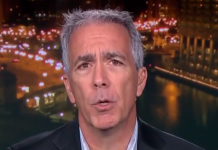A new report from the ACLU, A pound of flesh: The criminalization of private debt, outlines how one in three American adults who find themselves in debt turned over to a collection agency could be issued Dickensian “body attachment” arrest warrants that would demand they appear in court or wind up in prison.
The practice, encouraged by collection agencies, has turned lower level courts into “debt collection mills,” essentially resurrecting debt prisons, which were outlawed by federal law in 1833.
In 44 states, civil court judges can issue arrest warrants for unpaid bills to debtors.
The ACLU's new report "A Pound of Flesh: The Criminalization of Private Debt" is the first to assess this massive problem on a national scale. We found cases of arrest warrants issued at the behest of private debt collectors in 26 states and Puerto Rico. https://t.co/XzsxxstsOE
— ACLU of Nevada (@ACLUNV) February 23, 2018
“When being in debt can get you sent to prison, and being in prison can drive you further into debt, ‘what we’re really seeing is the broad criminalization of poverty,’ said Marceline White, executive director of the Maryland Consumers Union.”
A report from The Intercept reveals how the lobbying arm of the collections industry, President Donald Trump’s new Consumer Financial Protection Bureau head, Mick Mulvaney, state legislators, and the Republican-controlled Congress are all complicit with the trend to put people in jail when they are unable to pay off debts.
Once in prison, bails are sometimes set much higher than the debts they have been ordered to pay back. Sometimes, people are unaware they have even been served a warrant to appear in court until they find themselves under arrest. Then, they are trapped, unable to pay off the bail, much less “criminal justice debt” that traps poor people in the system.
Debt collectors are very often more concerned with gaining leverage against those in debt than the cost to that person’s life, even if the defendant had little chance to respond to warrants.
“Collectors have little incentive to properly notify defendants in these cases,” said Jennifer Turner, a human rights researcher at ACLU. ‘We found examples of people missing court dates due to work, childcare responsibilities, lack of transportation, physical disability, illness, or just because they didn’t receive notification of the court date.'”
There have been few changes to legislation to prevent the trend to debt prisons, with a few exceptions:
The state of Maryland has introduced “The Jared Kushner Act,” to counter the practice that the Kushner family notoriously used to arrest tenants who were behind on rent. The family’s management firm had “most aggressive record of any landlord in the state,” seeking the arrest of 100 delinquent tenants since 2013. The bill would limit the warrants to unpaid rents totaling over $5,000.
Maryland also introducing a bill to eliminate bail when “body attachment” arrest warrants are issued. After going through a “debtor examination” process, the defendant would be released.
Illinois banned “pay or appear” notices in 2012. Before the ban, debtors had to appear in court every month to give an explanation on why they couldn’t pay back their debt, even when there were no changes to their financial status. A new law requires the courts to consider the defendant’s financial status before issuing the order.
“A lot of my constituents were being penalized because they were poor,” explained Maryland delegate Bilal Ali, who introduced the bill.
Statistically, this trend to jail people in debt will affect someone you know, in a country where most people are living paycheck to paycheck.
“Seventy-eight percent of full-time workers said they live paycheck to paycheck, up from 75 percent last year, according to a recent report from CareerBuilder.
Overall, 71 percent of all U.S. workers said they’re now in debt, up from 68 percent a year ago, CareerBuilder said.”
It certainly doesn’t help the situation whatsoever that Trump’s head Of CFPB, Mulvaney appears to be protecting payday lenders and loan sharks that seek to drive more Americans into inescapable debt.
Of course, the ever-widening disparity of income inequality brought about by so-called “trickle-down economics” and Republican attacks on unions through “right to work” laws have only served to increase the likelihood that most Americans will wind up in debt, working longer hours for less pay and fewer benefits.
See more in the video from Wochit News below:
Featured image By Keith Williamson via Flickr/ CC-BY 2.0/ YouTube video.











